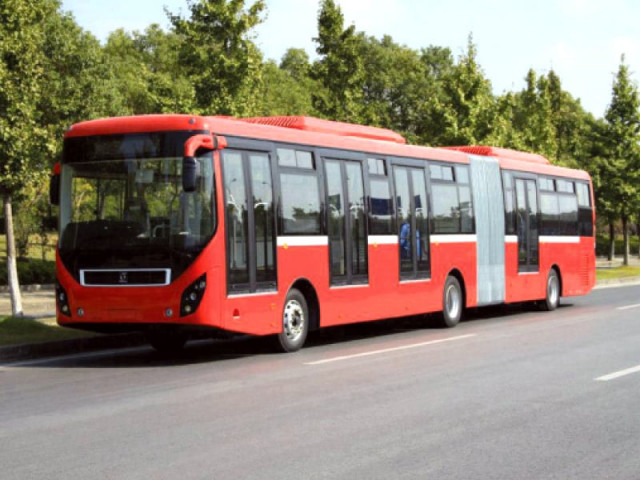Economically unviable: Metro Bus - a white elephant painted red
Though reliable, fast and respectable, it leaves much to be desired

PHOTO: FILE
The recently-launched Rawalpindi-Islamabad Metro Bus Service has been hailed as a ‘development gift’ by the leadership of PML-N for the people of the twin cities.
As the intra-city public transport across the country remains in shambles, the launch of this new Metro bus service needs to be appreciated. However, the business model of the bus service under an otherwise business-savvy regime leaves much to be desired.
It is ironic that the political party that voted to privatise bleeding State-Owned Enterprises (SOEs) is creating new SOEs. PML-N was voted to privatise PIA and Railways - instead it has started running buses with state support.
When price is distorted, either by fixing floors or ceilings; functioning and competitive markets disappear. Such markets push genuine market participants out by both, an excess demand and supply glut.
The Rawalpindi-Islamabad (renamed as Pakistan) Metro Bus Project (PMBP) is a case of price ceiling, which has created an excess demand and put unnecessary burden on the new service. It is also diverting genuine customers from using it.
To gain first-hand experience, I undertook a complete round trip on a hot Friday afternoon.
Read: New beginnings: Residents welcome metro bus service
In my interviews with fellow passengers, I was amazed to find ‘non-customers’- i.e. people travelling who would otherwise have never travelled on the same route by any means.
A market price is the only yardstick which allocates resources according to the valuation a customer places. In the absence of market price, it becomes impossible to judge customer valuation.
Result: on busy stops, there was an average waiting time period of half an hour just to get a ticket, which was defeating the very purpose of starting this Metro service.
The official numbers
The current ticket is flat Rs20, irrespective of the number of stops in a journey. If the government wishes to only recover the capital costs invested in the new service - Rs45 billion - it will take approximately 28 years at the going rate. However, there is no plan in place for it.
For each ticket, the federal and provincial government will pay Rs50 as subsidy which amounts to Rs2 billion every year. This also means that PMBP will be subsidised by non-users.
An important parameter of price is opportunity cost principle. Before PMBP was inaugurated, a passenger travelling from Pindi, Saddar to Islamabad, Secretariat would pay around Rs50 one way for an unsafe, uncomfortable and disjointed public transport.
The replacement with a reliable, respectable and faster bus service should have been accompanied with a slightly higher price. However, as politicians loath basic economics, they fixed a much lower price of Rs20, thus creating excess demand.
According to official numbers, the average operating cost for a bus trip comes out to be around Rs9,100. The average revenue for the same trip earned by the Authority is Rs2,600, recording a loss of Rs6,500 on every trip.
Read: Lined with gold? After paving paradise, metro bus takes off
This route witnesses around 1,000 such trips every day. It means that the daily revenue is not sufficient to make up for the variable expenses. This is what we call ‘shut-down condition’.
At this rate, any going concern would prefer closing down operations instead of sustaining losses.
The Metro bus tariff also defies a common practice around the world – “pay as you go”, whereas the Metro service is built on flat pricing.
A passenger traveling from Centaurus Towers (the anti-commerce bias got the name changed to PIMS) to Secretariat should pay less than the customer travelling from Secretariat to Saddar. However, because we are all followers of cross-subsidy idea, we end up charging everyone the same.
In other words, short distance travellers pay for long-distance travellers. This incentivises passengers to travel longer for just maximising their joy ride and keeping real customers out of the bay.
In short, Metro bus service undertakes to solve one of the most pressing problems of our cities - absence of reliable and good quality public transport.
In that, it doles out welfare instead of following a fiscally responsible and economically viable approach. The federal and provincial governments thus have set a bad model of solving a real problem and have ended up creating one more white elephant, painted in red!
the writer is founder and executive director of PRIME Institute, an independent think tank based in Islamabad
Published in The Express Tribune, June 29th, 2015.
Like Business on Facebook, follow @TribuneBiz on Twitter to stay informed and join in the conversation.


















COMMENTS
Comments are moderated and generally will be posted if they are on-topic and not abusive.
For more information, please see our Comments FAQ